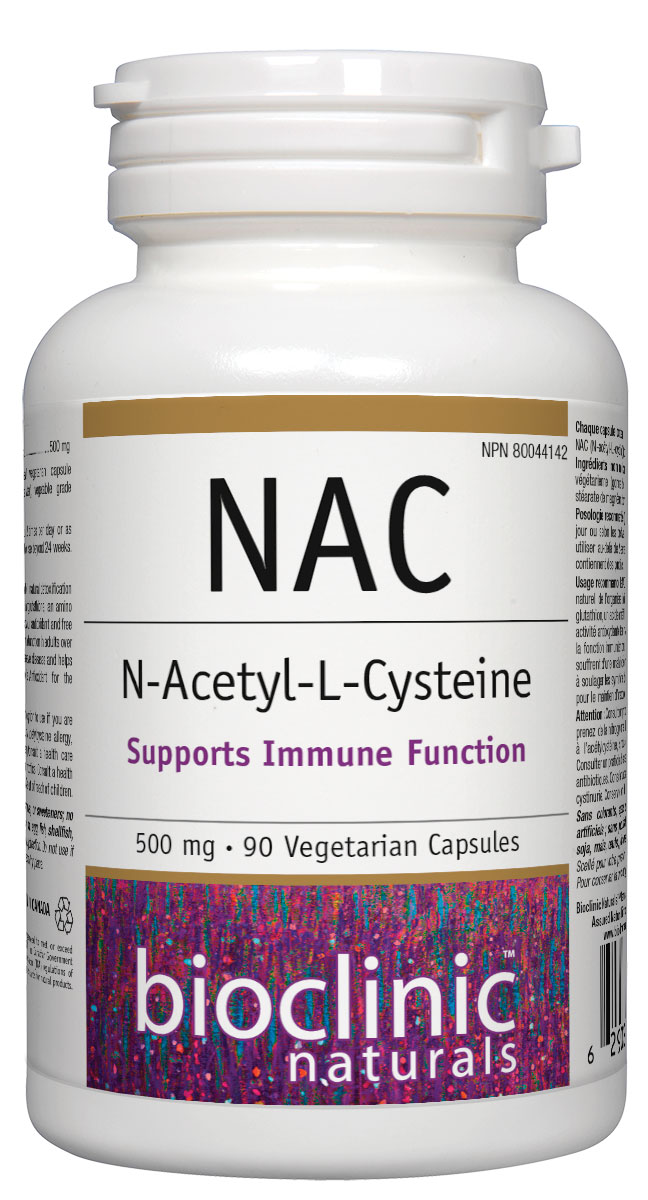
N-Acetyl-L-Cysteine
500 mg
90 Vegetarian Capsules ( SKU: 9524, NPN: 80044142 )
Benefits
- Supports glutathione synthesis, key cellular antioxidant and conjugator of numerous environmental toxins
- Improves endothelial function and supports nitric oxide synthesis
- 500 mg NAC per capsule allows for easy and therapeutic dosing levels
- Stable and well-absorbed form of the easily oxidized amino acid L-cysteine
- Evidence base for diverse clinical uses
Feature Summary
N-Acetyl-L-Cysteine (NAC) is known to have diverse physiological and therapeutic benefits, attributed largely to its antioxidant, anti-inflammatory and mucolytic effects. It is well-accepted to increase the critical intracellular antioxidant glutathione, by supplying a stable form of L-cysteine, the rate-limiting factor for glutathione synthesis.1 The number of conditions with altered glutathione homeostasis continues to grow, including not only cardiovascular, neurodegenerative, pulmonary and age-related diseases, but there is also a growing clinical recognition of metabolic disturbances linked to environmental toxin exposure, such as diabetes and persistent organic pollutants.2 By restoring glutathione levels, NAC also is well established as the most effective therapy for acetaminophen toxicity.3
Additionally, NAC’s ability to cleave disulfide bonds provides efficacy as a mucolytic agent, with clinical benefit for individuals with COPD and pulmonary fibrosis.4,5 Breaking disulfide bonds may also be the same mechanism by which it lowers homocysteine and improves endothelial function in coronary artery disease.6 NAC has immunomodulating and anti-inflammatory effects, improving influenza symptomology and SLE disease activity.7,8 By modulating glutamatergic and neurotropic pathways, NAC also has shown benefit for schizophrenia, bipolar disorder and autism.9,10,11,12
Medicinal Ingredients
| Each Capsule Contains: | |
| NAC (N-Acetyl-L-Cysteine) (Free Form) | 500 mg |
Non-Medicinal Ingredients
Rice starch, vegetarian capsule (carbohydrate gum [cellulose], purified water), vegetable grade magnesium stearate (lubricant).
Dosage:
1 capsule 2–3 times per day or as directed by a health care practitioner. Do not use beyond 24 weeks. Take with meals providing protein.
Warnings:
Consult a health care practitioner prior to use if you are taking nitroglycerin or antibiotics. Do not use if you have acetylcysteine allergy, or if you are pregnant or breastfeeding. Consult a health care practitioner if you have cystinuria. Keep out of reach of children.
Allergens:
Contains no artificial colours, preservatives, or sweeteners; no dairy, sugar, wheat, gluten, yeast, soy, corn, egg, fish, shellfish, salt, tree nuts, or GMOs. Suitable for vegetarians.
Contraindications
Consult a health care practitioner prior to use if you are taking nitroglycerin. Do not use if you have acetylcysteine allergy, or if you are pregnant or breastfeeding. Consult a health care practitioner prior to use if you are taking antibiotics. Consult a health care practitioner if you have cystinuria. Keep out of reach of children.
Drug Interactions
Although NAC may reduce nitroglycerin tolerance and improve its efficacy for unstable angina, severe headaches and hypotension may occur. NAC may also reduce the capacity of activated charcoal to absorb acetaminophen.
- Dodd S, Dean O, Copolov DL, Malhi GS, Berk M. N-acetylcysteine for antioxidant therapy: pharmacology and clinical utility. Expert Opin Biol Ther. 2008 Dec;8(12):1955-62.
- Lee DH, Lee IK, Song K, Steffes M, et al. A strong dose-response relation between serum concentrations of persistent organic pollutants and diabetes: results from the National Health and
Examination Survey 1999-2002. Diabetes Care. 2006 Jul;29(7):1638-44. - Blackford MG, Felter T, et al. Assessment of the clinical use of intravenous and oral N-acetylcysteine in the treatment of acute acetaminophen poisoning in children: a retrospective review.
Clin Ther. 2011 Sep;33(9):1322-30. - Sutherland ER, Crapo JD, Bowler RP. N-acetylcysteine and exacerbations of chronic obstructive pulmonary disease. COPD. 2006 Dec;3(4):195-202.
- Demedts M, Behr J, Buhl R, et al., for the IFIGENIA Study Group. High-dose acetylcysteine in idiopathic pulmonary fibrosis. N Engl J Med. 2005;353(21):2229–2242.
- Yilmaz H, Sahin S, Sayar N, et al. Effects of folic acid and N-acetylcysteine on plasma homocysteine levels and endothelial function in patients with coronary artery disease. Acta Cardiol. 2007
Dec;62(6):579-85. - De Flora S, Grassi C, Carati L. Attenuation of influenza-like symptomatology and improvement of cell-mediated immunity with long-term N-acetylcysteine treatment. Eur Respir J. 1997
Jul;10(7):1535-41. - Lai ZW, Hanczko R, Bonilla E, et al. N-acetylcysteine reduces disease activity by blocking mammalian target of rapamycin in T cells from systemic lupus erythematosus patients: a randomized,
double-blind, placebo-controlled trial. Arthritis Rheum. 2012 Sep;64(9):2937-46. - Carmeli C, Knyazeva MG, Cuénod M, et al. Glutathione precursor N-acetyl-cysteine modulates EEG synchronization in schizophrenia patients: a double-blind, randomized, placebo-controlled trial.
PLoS One. 2012;7(2):e29341. - Dean O, Giorlando F, Berk M. N-acetylcysteine in psychiatry: current therapeutic evidence and potential mechanisms of action. J Psychiatry Neurosci. 2011 Mar;36(2):78-86.
- Hardan AY, Fung LK, Libove RA, et al. A randomized controlled pilot trial of oral N-acetylcysteine in children with autism. Biol Psychiatry. 2012 Jun 1;71(11):956-61.
- Berk M, Copolov DL, Dean O, et al. N-acetyl cysteine for depressive symptoms in bipolar disorder–a double-blind randomized placebo-controlled trial. Biol Psychiatry. 2008 Sep 15;64(6):468-75.
